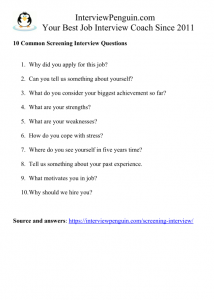Screening interviews help the recruiting managers with the first selection of job applicants. Who will make the cut? Who will fail? Conducted typically over the phone, or in a form of group interview, the interviewers try to get a good grasp of your personality, and motivation–that is their primary goal at this stage. Do you really want the job? What are your communication skills? Do you meet the basic job requirements in terms of education and experience? What motivates you to apply for the job?
They try to find the answers to these questions while talking to you. Recruiting managers will typically screen out more than fifty percent of all applicants during this stage of hiring process. How to be the one who passes the screening interview, and progresses to the next round? The answer is simple: you should prepare for the questions, and you should demonstrate your motivation to work for them. Let’s analyze how you can do it…
* Feeling anxious? Check our simple guide on How to overcome interview nerves.
Same questions every time
Whether they interview you face to face, over the phone, on Skype, on Zoom, or even using a virtual machine (pre-recorded interview questions you’d answer online), you will deal with similar questions in every screening interview.
Most of the questions (not all) are relatively simple, because our goal is to hear you talking. Every word you say, every gesture you make, tells something about you. The exact questions are not so important at this stage of recruiting process–and that’s why many companies will go with common interview questions. Your answers to these questions tell them enough about your personality and motivation. They will keep the really tough questions for second, and final interview with you…
Common questions for screening interviews
- Why did you apply for this job? Give them a clear reason, say what caught your eye on their job description. Show them that you did not apply just because you need any job, but because you really want the position they advertise.
- Can you tell us something about yourself? Focus on things that are relevant for the employer–your experience, education, your present situation in terms of having a job, your hobbies and interests that relate to the position you try to get with them.
- What do you consider your biggest achievement so far?
- What are your strengths? Try to pick something that matters for a job. This changes from one position to another, but it is good to show the employer that you are aware of your skills, and believe that you can do a great job at their company.
- What are your weaknesses? You should pick a weakness that is not central for the job. And you should always emphasize that you work on improving your weaknesses, in your pursuit of perfection…
- How do you cope with stress?
- Where do you see yourself in five years time? Again, a good answer depends on the job you apply for. In most cases it is good to connect your future with the company–saying you’d be happy to work for them in five years time. In some other cases it is better to focus on your personal goals.
- Tell us something about your past experience. Tell them not only what you did, but also how your past roles prepared you for the job you try to get with them. Focus on achievements, and how you helped your past employers. Try to avoid negative remarks about your past colleagues.
- What motivates you in job? A good answer depends on the position you apply for. Nevertheless, you should not talk about money as your primary motivation. Show them that you see a meaningful purpose in your work, and won’t lose your motivation quickly.
- Why should we hire you?
Special tip: Want to stand out in your screening interview, saying exactly what the hiring managers want to hear from an excellent job candidate? Check out our Interview Success Package for multiple premium answers to 20 most common screening interview questions (+ answers to questions that await you in later stages of the interviews). Thank you for checking it out!
Things we observe in a screening interview
An experienced and skilled recruiting manager can observe a lot of things while listening to your interview answers:
- Your listening skills, whether you talk to the point, or answer a totally different question (this happens quite often).
- Whether you are introverted or extroverted (we can see it from the way you talk, the way you look at us, etc).
- What matters for you the most in job and in life (your answers to simple questions about your education, experience and hobbies tell us a lot about the things that matter to you).
- Whether you are a good fit for the position, considering your future colleagues, the working environment, and other things we know about, but you know little about them in the screening stage of the hiring process.
- Whether we can count with you in a long run (the way you talk about your past jobs and your career plans tells a lot about your loyalty and about other things that determine how long you’d stay with us).
- Whether you are honest to yourself and to others. Are you humble, confident, over-confident? (answers to the questions about your strengths and weaknesses indicate the picture you have about yourself)
- …
Special Tip no. 2: You can download the list of questions in a one page long PDF, and practice your interview answers anytime later, even when offline:

Conclusion and next steps
Screening interviews make sense. They help the employers with the first selection of job candidates, they help them to understand whether it makes sense to invite you for the second interview, or it would be just a waste of time for them.
Online, over the phone, or face to face–the questions will be similar in every screening interview. Think about the most common questions, and prepare a good answer. Do not forget to show enthusiasm and motivation while talking to the employer.
And if you are not sure what to do, or how to proceed, consider hiring an interview coach, or check our Interview Success Package. You will find in it up to ten premium answers to every interview question they may realistically throw at you (not only in the screening stage, but also later on during the hiring process), and a clear explanation of what exactly they want to hear from you…
You will find some excellent sample answers directly on the product page, so it makes sense to check it out even if you do not plan to purchase anything… Thank you, I wish you best of luck in your interviews!
Matthew Chulaw,
Your personal job interview coach
May also interest you:
- Body language in an interview – What do your gestures and movements say about you? Can we control our non-verbal communication?
- Salary negotiation tips – Get as much as you deserve, or even more…
- Behavioral interview questions – Learn how to ace the 2nd stage of your interview process.


